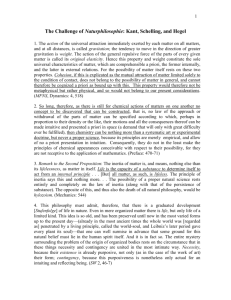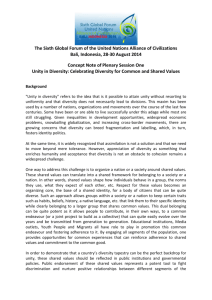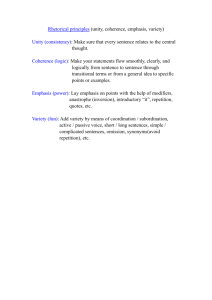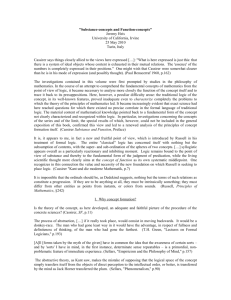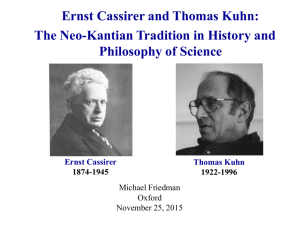Quotes
advertisement
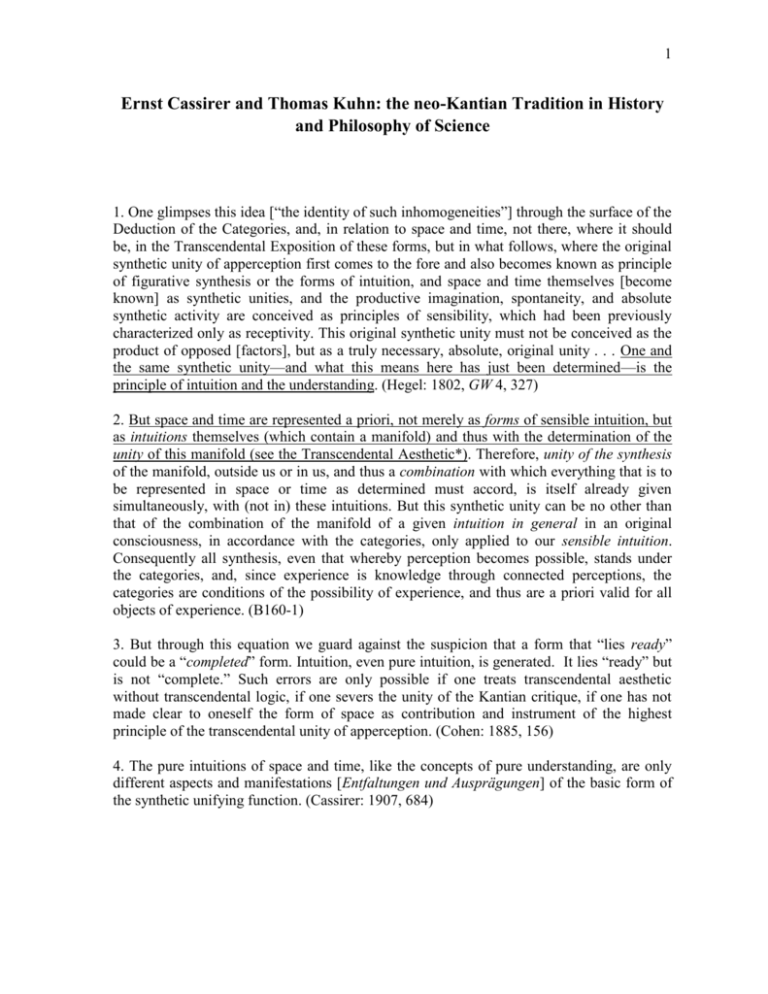
1 Ernst Cassirer and Thomas Kuhn: the neo-Kantian Tradition in History and Philosophy of Science 1. One glimpses this idea [“the identity of such inhomogeneities”] through the surface of the Deduction of the Categories, and, in relation to space and time, not there, where it should be, in the Transcendental Exposition of these forms, but in what follows, where the original synthetic unity of apperception first comes to the fore and also becomes known as principle of figurative synthesis or the forms of intuition, and space and time themselves [become known] as synthetic unities, and the productive imagination, spontaneity, and absolute synthetic activity are conceived as principles of sensibility, which had been previously characterized only as receptivity. This original synthetic unity must not be conceived as the product of opposed [factors], but as a truly necessary, absolute, original unity . . . One and the same synthetic unity—and what this means here has just been determined—is the principle of intuition and the understanding. (Hegel: 1802, GW 4, 327) 2. But space and time are represented a priori, not merely as forms of sensible intuition, but as intuitions themselves (which contain a manifold) and thus with the determination of the unity of this manifold (see the Transcendental Aesthetic*). Therefore, unity of the synthesis of the manifold, outside us or in us, and thus a combination with which everything that is to be represented in space or time as determined must accord, is itself already given simultaneously, with (not in) these intuitions. But this synthetic unity can be no other than that of the combination of the manifold of a given intuition in general in an original consciousness, in accordance with the categories, only applied to our sensible intuition. Consequently all synthesis, even that whereby perception becomes possible, stands under the categories, and, since experience is knowledge through connected perceptions, the categories are conditions of the possibility of experience, and thus are a priori valid for all objects of experience. (B160-1) 3. But through this equation we guard against the suspicion that a form that “lies ready” could be a “completed” form. Intuition, even pure intuition, is generated. It lies “ready” but is not “complete.” Such errors are only possible if one treats transcendental aesthetic without transcendental logic, if one severs the unity of the Kantian critique, if one has not made clear to oneself the form of space as contribution and instrument of the highest principle of the transcendental unity of apperception. (Cohen: 1885, 156) 4. The pure intuitions of space and time, like the concepts of pure understanding, are only different aspects and manifestations [Entfaltungen und Ausprägungen] of the basic form of the synthetic unifying function. (Cassirer: 1907, 684) 2 5. Kant was a revelation. And I remember everybody giving a presentation in the section meetings, and I gave a presentation on Kant and the notion of presuppositions for knowledge. . . [My presentation] was thought very well of, but it just knocked me over, that notion, and you can see why that’s an important story. . . [I]t’s an important story because I go around explaining my position saying I am a Kantian with movable categories. It’s got what is no longer quite a Kantian a priori, but that experience surely prepared me for the Kantian synthetic a priori. And I do talk about the synthetic a priori. (Kuhn: 2000, 264). 6. Both [of Reichenbach’s] meanings make the world in some sense mind-dependent, but the first disarms the apparent threat to objectivity by insisting on the absolute fixity of the categories, while the second relativizes the categories (and the experienced world with them) to time, place, and culture. (1993, 331) 7. I continued to study the writings of Alexandre Koyré and first encountered those of Emile Meyerson, Hélène Metzger, and Anneliese Maier. More clearly than most other recent scholars, this group has shown what it was like to think scientifically in a period when the canons of scientific thought were very different from those current today. (1970, v-vi) 8. [The proper] attitude toward past thinkers came to the history of science from philosophy. Partly it was learned from men like Lange and Cassirer who dealt historically with people or ideas that were also important for scientific development . . . And partly it was learned from a small group of neo-Kantian epistemologists, particularly Brunschvicg and Meyerson. (1977, 107-8) 9. The concept of historical reconstruction that underlies [my Planck book] has from the start been fundamental to both my historical and my philosophical work. It is by no means original: I owe it primarily to Alexandre Koyré; its ultimate sources lie in neo-Kantian philosophy. (1987, 361) 10. The identity towards which thought progressively strives is not the identity of ultimate substantial things but the identity of functional orders and coordinations. But the latter do not exclude the moments of difference and change but only achieve determination in and with them. It is not manifoldness as such that is annulled [aufgehoben], but [we attain] only a manifold of another dimension: the mathematical manifold takes the place of the sensible manifold in scientific explanation. What thought requires is thus not the dissolution of diversity and change as such, but rather their mastery in virtue of the mathematical continuity of serial laws and serial forms. (Cassirer: 1910, 431) 11. E. Cassirer, in his Erkenntnisproblem, vol. I, expresses the opinion that Galileo resurrected the Platonist ideal of scientific knowledge; from which follows, for Galileo (and Kepler), the necessity for mathematising nature . . . Unfortunately (at least in our opinion) Cassirer turns Plato into Kant. Thus, for him, Galileo’s ‘Platonism’ is expressed by his giving priority to function and law over being and substance. (Koyré: 1978, 223) A. Koyré, “Die Philosophie Emile Meyersons,” Deutsch-Französische Rundschau 4 (1931): 197-217 3 12. There is, I think, no theory-independent way to reconstruct phrases like ‘really there’; the notion of a match between the ontology of a theory and its ‘real’ counterpart in nature now seems to me illusive in principle. Besides, as a historian, I am impressed with the implausibility of the view. I do not doubt, for example, that Newton’s mechanics improves on Aristotle’s and that Einstein’s improves on Newton’s as instruments for puzzle-solving. But I can see in their succession no coherent direction of ontological development. (Kuhn: 1970, 206-7) 13. Geometry (G) [according to Poincaré’s standpoint] asserts nothing about the behavior of actual things, but only geometry together with the totality (P) of physical laws. We can say, symbolically, that only the sum (G) + (P) is subject to the control of experience. So (G) can be chosen arbitrarily, and also parts of (P); all of these laws are conventions. In order to avoid contradictions it is only necessary to choose the remainder of (P) in such a way that (G) and the total (P) together do justice to experience. On this conception axiomatic geometry and the part of the laws of nature that have been elevated [erhobene] to conventions appear as epistemologically of equal status. (Einstein: 1921, 8) A. Einstein, “Nichteuklidische Geometrie und Physik,” Die neue Rundschau 36 (1925): 1620 14. Either one accepts that the ‘body’ of geometry is realized in principle by the solid bodies of nature, if only certain prescriptions are maintained regarding temperature, mechanical stress, and so on; this is the standpoint of the practicing physicist. Then a natural object corresponds to the ‘interval’ of geometry, and all propositions of geometry thereby attain the character of assertions about real bodies. This standpoint was represented especially clearly by Helmholtz, and one can add that without it establishing the [general] theory of relativity would have been practically impossible. Or, one denies in principle the existence of objects that correspond to the fundamental concepts of geometry. Then geometry alone contains no assertions about objects of reality, but only geometry together with physics. This standpoint, which may be more perfect for the systematic presentation of a completed physics, was represented especially clearly by Poincaré. On this standpoint the total content of geometry is conventional; which geometry is to be preferred depends on how ‘simple’ a physics can, by its use, be established in agreement with experience. (Einstein: 1925, 18-9). 15. The reality of the physicist stands opposite the reality of immediate perception as a thoroughly mediated reality: as a totality, not of existing things or properties, but rather of abstract symbols of thought that serve as the expression for determinate relations of magnitude and measure, for determinate functional coordinations and dependencies in the appearances. (Cassirer: 1921, 14) 16. [Einstein’s theory can be incorporated within the “critical” conception of knowledge] without difficulty, for this theory is characterized from a general epistemological point of view precisely by the circumstance that in it, more consciously and more clearly than ever before, the advance from the copy theory of knowledge to the functional theory is completed. (1921, 55) 4 17. Kant also had emphasized decisively [that] this form of dynamical determination does not belong any longer to intuition as such, but rather it is the ‘rule of the understanding’ alone through which the existence of appearances can acquire synthetic unity and be taken together in a determinate concept of experience. The step beyond [Kant] that we now had to complete on the basis of the results of the general theory of relativity consisted in the insight that in these determinations of the understanding, in which the empirical-physical picture of the world first arises, geometrical axioms and laws other than those of Euclidean form can enter in, and allowing such axioms not only does not destroy the unity of the world—that is, the unity of our concept of experience of a total ordering of the phenomena—but it truly first grounds this unity from a new point of view, in that in this way the particular laws of nature we have to reckon with in space-time-determination all finally cohere in the unity of a highest principle: precisely the general postulate of relativity. (1921, 109) 18. When I speak of a “Phenomenology of Knowledge,” I do not align myself with modern usage, but I go back to the fundamental meaning of “phenomenology” as Hegel established and systematically grounded and justified it. For Hegel phenomenology becomes the fundamental presupposition of philosophical knowledge, because he requires of the latter that it comprehend the totality of spiritual forms, and because this totality, according to him, can only be made visible in the transition from one form to another. [There follows a quote from Hegel to the effect that the individual has the right to demand that science provide a “ladder” from more primitive consciousness to science.] It cannot be expressed more sharply that the end, the “telos” of spirit cannot be grasped and expressed if one takes it as something self-subsistent, if one takes it as dissolved and separated from the beginning and the middle. (1929, vi-vii) 19. That myth stands to the universal task of the phenomenology of spirit in an internal and necessary relationship can be mediately derived from Hegel’s own conception and determination of this concept. [The same passage from Hegel is quoted at greater length.] These propositions, in which Hegel characterizes the relationship of “science” to sensible consciousness, are valid to the full extent and with full precision for the relationship of knowledge to mythical consciousness. For the proper point of departure for all becoming of science, its beginning in the immediate, lies not so much in the sphere of sensible intuition as in that of mythical [intuition]. . If, therefore, in accordance with Hegel’s demand, “science” is supposed to offer the ladder to natural consciousness that leads to itself, then it must set this ladder one more rung lower. (1925, ix-x) 20. In his philosophy of history Hegel wanted to provide the definitive speculative demonstration that reason is substance and infinite power. For this, however, we must, according to him, above all attain the insight that reason is “not so powerless as to pass for a mere ideal, a mere ought.” . . . If we turn back from the Hegelian meaning of the idea to the Kantian, from the idea as “absolute power” back to the idea as “infinite task,” we must of course give up the speculative optimism of the Hegelian view of history. But, at the same time, we thereby also avoid fatalistic pessimism with its prophecies and visions of decline. [Our] acting again has a free path to decide for itself out of its own force and responsibility, and it knows that the direction and future of culture will depend on the manner of this decision. (Cassirer: 1939, 28)

